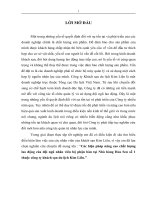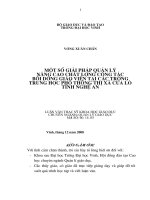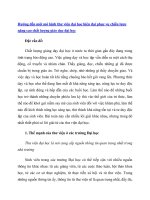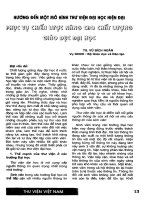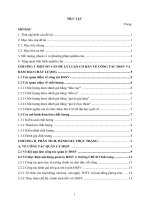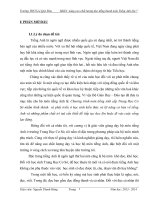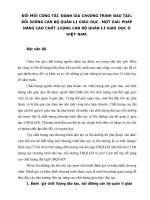Chiến lược nâng cao chất lượng hoạt động thanh tra giáo dục tại tỉnh thanh hóa
Bạn đang xem bản rút gọn của tài liệu. Xem và tải ngay bản đầy đủ của tài liệu tại đây (382.27 KB, 115 trang )
i
STRATEGIES TO IMPROVE THE QUALITY OF EDUCATIONAL INSPECTION
ACTIVITIES IN THANH HOA PROVINCE
A Dissertation Presented to the
Faculty of International Graduate School
Southern Luzon State University, Lucban, Quezon, Philippines
In Collaboration with
Thai Nguyen University, Socialist Republic of Vietnam
In Partial Fulfillment of the
Requirements for the Degree of
Doctor of Philosophy in Education Management
LE MINH HUNG
April, 2014
i
APPROVAL SHEET
The Dissertation of
LE MINH HUNG
entitled
STRATEGIES TO IMPROVE THE QUALITY OF EDUCATIONAL INSPECTION
ACTIVITIES IN THANH HOA PROVINCE
Submitted in Partial Fulfillment of the
Requirements for the Degree
Doctor of Philosophy in Educational Management
In the Graduate School
Southern Luzon State University, Republic of the Philippines
in collaboration with
Thai Nguyen University, Socialist Republic of Vietnam
has been approved by the Committee
_____________________ ______________________
Member Member
______________________
______________________
______________________
Chairman
DR. APOLONIA A.ESPINOSA DR. APOLONIA A. ESPINOSA
Adviser Dean, Graduate School
Accepted in partial fulfillment of the requirements for the degree
Doctor of Philosophy in Educational Management
WALBERTO MACARANAN, Ed. D
Vice President, Academic Affairs
_____________________
Date
ii
ACKNOWLEDGMENT
The researcher wishes to extend his most sincere gratitude to the following people,
who in one way or another, made this piece of work a reality:
Dr. Cecilia N. Gascon, President of Southern Luzon State University, Republic of the
Philippines, who made possible the linkage with Thai Nguyen University and the offering of
Doctor of Philosophy in Educational Management, through the ITC-TUAF;
Dr. Dang Kim Vui, President of Thai Nguyen University, who developed the linkage
with Southern Luzon State University, Republic of the Philippines and the offering of Doctor
of Philosophy in Educational Management, through the ITC-TUAF;
Dr. Apolonia A. Espinosa, his research adviser, for his support and supervision
throughout his graduate study program. His advice and support during the conduct of his
study has greatly helped him a lot;
Prof. Nordelina Ilano, Director, Office for International Affairs of SLSU for her
outright assistance to the Ph.D. students;
Dr. Tran Thanh Van, the Dean of the Graduate School of Thai Nguyen University, for
his assistance and encouragement to pursue this study;
Dr. Dang Xuan Binh, the Director of International Training Center, for his
indefatigable effort to encourage the Ph.D. students to pursue this study;
To all the SLSU and TNU Professors, who unselfishly shared their time and
knowledge throughout the graduate studies in Thai Nguyen University, Vietnam;
Special thanks to his family and friends for their support, encouragement for being
the sources of greatest inspiration, which made his career a success.
Le Minh Hung
iii
TABLE OF CONTENTS
TITLE PAGE Page
APPROVAL SHEET i
ACKNOWLEDGMENT ii
TABLE OF CONTENTS iii
LIST OF TABLES v
LIST OF FIGURES vii
LIST OF APPENDIX viii
ABSTRACT ix
CHAPTER 1: INTRODUCTION………………………………………………………… 1
Background of the Study 4
Objectives of the study 6
Hypothesis of the Study 7
Significance of the Study 7
Scope and Limitation of the Study 8
Definition of Terms 8
CHAPTER 2 REVIEW OF RELATED LITERATURE. . . . . . . . . . . . . . . . . . . . . . .12
Review of Related Literature 10
Research paradigm 41
CHAPTER 3 METHODOLOGY……… … 43
Locale of the Study 43
Research Design 43
Respondents of the study 44
Research Instruments 44
Data Gathering Procedures 45
Statistical Treatment 45
iv
CHAPTER 4 RESULTS AND DISCUSSION 48
CHAPTER 5 SUMMARY OF FINDINGS, CONCLUSIONS
AND RECOMMENDATIONS 68
Summary 68
Findings 69
Conclusions 71
Recommendations 72
BIBLIOGRAPHY 74
APPENDIX 79
CURRICULUM VITAE 105
v
LIST OF TABLES
1: Level of Educational Inspection Activities in terms of Professional Inspection…… 48
2. Level of Educational Inspection Activities in terms of Inspection Management… 49
3. Level of Educational Inspection Activities in terms of Complaint Management… …50
4. Educational Qualifications of the Respondent Schools as to Professional Quality of Teachers
………………………………………………………………………………………… ……51
5. Educational Quality of the respondents' school as to the Performance of Students… 54
6. Difference between the Schools and their Educational Inspection Activities in terms of
Professional Inspection ……………………………………………………………… ……56
7. Difference between the Schools and their Educational Inspection Activities in terms of
Inspection Management…………………………………………………………… ………57
8. Difference between the Schools and their Educational Inspection Activities in terms
of Complaint Management ………………………………………………………… …….57
9. Relationship of the professional quality of teachers to the Educational Inspection Activities
in terms of Professional Inspection ………………………………….…………… ………58
10. Relationship of the professional quality of teachers to the Educational Inspection
Activities in terms of Inspection Management……………………………………………… 59
11. Relationship of the professional quality of teachers to the Educational Inspection
Activities in terms of Complaint Management…………………………………….…………60
12. Relationship of the Performance of Students to the Educational Inspection Activities
in terms of Professional Inspection …………………………………………… ………61
13. Relationship of the Performance of Students to the Educational Inspection Activities
in terms of Inspection Management………………………………………… ………… 62
14. Relationship of the Performance of Students to the Educational Inspection Activities
in terms of Complaint Management ………………………………………… …………63
vi
Title:
STRATEGIES TO IMPROVE THE QUALITY OF
EDUCATIONAL INSPECTION ACTIVITIES IN
THANH HOA PROVINCE
Researcher:
Le Minh Hung
Degree Doctor of Philosophy, Development Education
Nam/ Address of the
Institution
Southern Luzon State University
Graduate School
Lucban, Quezon
Date Completed April, 2014
Adviser
Dr. Apolonia A. Espinosa
ABSTRACT
This study on “Strategies to Improve the Quality of Educational Inspection Activities
in ThanhHoa Province” was conducted to find out the strength and weaknesses of educational
training qu ality of all school levels in ThanhHoa Province during the Academic Year 2012-
2013, and then to offer suitable measures to improve the quality of educational management.
Specifically, this study sought to
(1) Determine the level of educational inspection activities as to:
• Professional inspection
• Inspection management
• Complaint management
(2) Find out the educational quality of the respondent schools as to
• Educational qualifications of teachers
vii
• Performance of students
(3) Establish the relationship betweeneducational inspection and educational quality;
and to
(4) Propose a program that will help improve the educational inspection activities
This study used the descriptive correlation design in analyzing the investigated
variables. It is designed to help determine the extent to which different variables are related to
each other in the population of interest and state that the critical distinguishing characteristics
are the effort to estimate a relationship, as distinguished from simple description.
Based on the data gathered, the following are the findings of the researcher:
1. The level of educational inspection activities in terms of professional inspection
shows that all the teachers in ThanhHoa Province were always using standard grade
equivalent with a mean score of 5.00. Teachers were also often pursuing their graduate studies
with a mean score of 4.40. And in ThanhHoa, only few teachers were observed to retain or
make their student in competent level with a mean score of 1.98. In general, the professional
inspections in ThanhHoa were sometimes observed with grand mean of 3.32.
While on the level of educational inspection activities in terms of inspection
management, it shows that the management of the schools in ThanhHoahave always set
specific date for the examination. And the administrative activities of the principal and the
school managing board were always abided to the instruction of the education and training
branch. But the transparency on school finances among students, staff and parents were
sometimes observed. In general, the inspection management was oftenly observed with
weighted mean of 3.89.
And, on the level of educational inspection activities in terms of complaint
management, it shows that unresolved complains are often directly referred to the highest
education management with mean score of 4.26. But they are sometimes resolved immediate
viii
remedy in five working days with mean score of 2.66. In general, complaint management
inspections were sometimes observed with grand mean of 3.30.
2. Considering the quality of the respondent schools in terms of educational
qualifications of teachers, data shows that out of a total of two-hundred eighty-nine (289)
teachers who taught in the said province, twenty-six percent (26%) had already attained their
master’s degree and the rest seventy-four percent (74%) were still at their bachelor’s degree.
This presents the distribution of the ten schools in ThanhHoa Province based on the highest
educational attainment of the employed teachers.
Whilst the educational quality of the respondents’ school as to the performance of the
students, data shows that the students in high school of ThanhHoaperforms 70 to 75 percent in
classroom level, 50 to 65 percent in inter-school level and only 25 to 35 percent got into
regional level; the students’ performance in secondary school was 40 to 50 percent in
classroom-level, 35 to 40 percent performance in inter-school level and 15 to 20 percent
performance in provincial level. And, data shows that the performances of the students in
primary schools was 45 to 55 percent in classroom level, 40 to 50 percent in inter-school level
and 20 to 35 percent were in provincial level.
3. In view of the significant difference of the educational inspection activities in terms
of professional inspection of the ten schools, results show that the observed professional
inspection were significantly different from the ten schools. Having p-value of 0.031 that is
less than to its threshold value of 0.05 leads to the rejection of the null hypothesis; thus, the
ten schools in ThanhHoa Province have different level on their educational inspection
activities in professional inspection.
Considering the significant difference of the educational inspection activities in terms
of inspection management of the ten schools, it shows that the observed inspection
management was the same as observed in the ten schools in ThanhHoa. Having p-value of
0.246 that is greater than to its threshold value of 0.05 leads to the acceptance of the null
ix
hypothesis; thus, the ten schools in ThanhHoa Province have same level on their educational
inspection activities in inspection Management.
While on the significant difference of the educational inspection activities in terms of
complaint management to the ten schools, it shows that the observed complaint management
was the same as observed in the ten schools in ThanhHoa. Having p-value of 0.103 that is
greater than to its threshold value of 0.05 leads to the acceptance of the null hypothesis; thus,
the ten schools in ThanhHoa Province have same level on their educational inspection
activities in complaint Management.
On the significant relationship of the professional quality of teachers to the level of the
educational inspection activities of the school in terms of professional inspection, it shows
that the educational degree of the teachers in ThanhHoa Province doesn’t affect the level of
professional inspection that the school was observed. Having p-value of 0.747 that is greater
than to their threshold value of 0.05 leads to the acceptance of the null hypothesis; thus, the
level of the educational inspection activities of the school in terms of professional inspection
doesn’t affect by the educational degree of the teacher.
1
Chapter I
INTRODUCTION
Vietnamese education is a socialist education with popular, national, scientific, and
modern characteristics wherein educational activities are conducted on the principles of
learning coupled with practice, education linked with production, theories connected to
practicability, and education at schools combined with education in the family and in the
society (Education Law in Vietnam, 2005). Educational development is the first national
priority with a view of improving people’s knowledge, training manpower, and fostering
talents. It must be linked with the requirements of socio-economic development, to the
scientific-technological advances,and to the consolidation of national defense and security;
must implement standardization, modernization, and socialization; must ensure the balance in
terms of qualifications, professional and regional structure; must expand scale on the basis of
quality and efficiency assurance; and must link education with employment.
In terms of State management of education, it is written in the Education Law in
Vietnam Chapter 1,Article 14 that: the State shall carry out the unified management of the
national educational system in terms of goals, programmes, contents, educational plans,
teachers’ standards, examination regulations and system of degrees/diplomas; focus on the
management of educational quality, exercise decentralization on educational management;
strengthen the autonomy and accountabilities of educational institutions.
In view of this, the educational management staff is expected to play an important role
in organizing, managing and directing educational activities; they must study and improve
themselves continuously in terms of moral standards, qualifications, management
competence and personal responsibility. The State therefore shall have plan to build and
improve the quality of educational management staff in order to promote roles and
2
responsibilities of educational management staff, ensuring the development of the cause of
education.
To meet the requirements of the country’s goals in national education, it is necessary
and urgent to review and apply some applicable innovation strategies and policies in
education and training in the way it is pointed out by Vietnam Government. To strengthen
education and training career, first and foremost the educational management in the country
must be improved.
However, managing education involves other problems. Many documents have
emphasized the importance of changing educational systems in general and educational
inspection in particular, which are the most vital stage in managing education. In this context,
it is the sole responsibility of the educational management staff to submit to the government
major guidelines affecting learningrights and duties of citizens nationwide, orientations for
reform of educational management related to the whole educational levels.
Since the birth of social science, many scientific fields of the inspection have been
discussed. According to C.Mac-Anghen (2009), "inspection is a process that requires the
government management in developing individuals to perform better". On the other hand,
Wanga noted (2008) that inspection can be conceptualized as overseeing, which involves
directing, controlling, reporting, commanding, and other such activities that emphasize the
task at hand and assess the extent to which particular objectives have been accomplished
within the bounds set by those in authority for their subordinates.
During the first inspection conference held on April 19, 1955, Ho Chi Minh, the
Vietnam President said: "Through inspection, it helps the inspectors see if the given policies
and missions have been completed successfully."Inspecting regularly can minimize the
misinterpretation of the education management policies of any organizations.
3
Inspection is an important stage of the entire educational management of the
government. It enables leaders to evaluate their own leadership and other authorized officials
to find out the most effective ways of management in line with the policies set by the
government. Many countries throughout the world have developed some means of
monitoring the quality and standards of their education systems. In most cases, the
monitoring process involves supervision by inspection of educational institutions such as
schools, and other aspects of the education systems. The critical role of inspection as one of
the dominant strategies for monitoring and improving the performance of education system in
schools cannot be overemphasized. Inspection is concerned, in the main, with the
improvement of standards and quality of education and should be an integral part of a school
improvement program. In many countries where inspectoral system of supervision of schools
is conducted, the responsibility for inspection lies with the Inspectorates. School inspection
practices, especially in Third World countries, such as Vietnam, are associated with
numerous problems which, as a result, strength its attempts to improve education quality into
the background.
To quote the Decision of the 2
nd
Central Committee Communist Party III, the main
targets of the educational management are "Innovation of management mechanisms, training
the manpower, improving the capacity of education and training, in order to complete the
inspection system of education, increase the number of inspectors, and focus on professional
inspection." Inspection is a professional activity, so it is a must to have professional training.
Each officer in the inspection system must be proficient enough to understand his/her own
tasks. Also, as noted by Hargreaves (2010), inspection is a powerful way of monitoring the
education system, tracking standards and performance levels over a period of time, and of
identifying schools’ failures.
4
In 1990, the State Council (now Chairman of the Convention) issued a system of
inspection which included the state inspectors, home affairs inspectors, and educational
inspectors. Then, in 1992 the Council of Office (now the Government) issued Decree
358/HDBT, which provided the educational inspection system to include the state inspectors,
home affairs inspectors, and educational inspectors.
In 2004, the Vietnam Government issued another inspection law which replaced the
1990 Inspection Law. It stated that the inspection system shall consist the following:
government inspectors, state inspectors, educational inspectors, provincial inspectors, and
district inspectors.
Effectiveness of the inspection includes management measures of inspection,
considering the inspectors' cooperation in reaching the set out objectives and missions with
less time and money. Effective inspection is closely linked with effective management
governance taking into consideration that inspection task is an essential stage of effective
management. At the same time, effective inspection depends heavily on the composition of
team of inspectors. Adequate and sufficient number of inspectors plays an important factor in
contributing to the effectiveness of inspection. However, due to limited number of regular or
permanent inspectors, other inspection team workers are assigned to assist the permanent
inspectors when necessary. Besides enhancing the team of inspectors, building qualified
inspection team is also very vital.
Background of the Study
In recent years, the inspection of Department of Education and Training in Thanh Hoa
has remarkably changed. For instance, it has directed educational institutions to contribute to
the improvement of management efficiency. Inspection has identified the targets and its
responsibilities to continuously improve management performance in order to strengthen the
quality of education in general and the quality of inspection activities in all high schools in
5
particular. However, inspection activities are still unreliable. For example, there are
inspectors and inspection team workers who are not experienced enough to perform their
tasks. To overcome these restrictions to meet the requirements of future inspection activities,
the Department of Education and Training in Thanh Hoa needs to increase the number of
inspectors, especially the inspection team workers who are qualified to change the inspection
management.
In 2003, Mr. Quang Anh and Mr. Ha Dang published their book: “Some essential
knowledge of inspection and examination of education and training” to summarize some
basic problems of education and training inspection {1}. In 2006, Mr. Ha TheTruyen wrote
on “Examining-inspection and evaluating in education” that this book is an important content
of professional competence for examining and inspection work in school.
To do this, it is vital that Thanh Hoa Province should carry out suitable measures to
enhance the inspection in order to uplift the quality of all schools in the long-term stability.
Moreover, a number of studies on Ph.D. Educational Management that dealt about
educational inspection in the training inspections course were conducted with focus about
inspection, examining and providing further knowledge for the inspection staff. Said topics
and articles were specifically focused on the typical issues of inspection work, but the main
aspect of inspection is examining the teachers, schools and the managing strategy on
inspection’s work, and other valuable and useful documents. However, none of them
discussed the details and conducted specific research about the ways on how to train and
develop inspection staff regarding the national education system in general and the education
of ThanhHoa in particular. In view of this, building and developing the inspection staff is
really necessary; hence, there is a need to conduct a research both in theory and reality on
educational inspection activities in Thanh Hoa. This topic, therefore, is considered urgent to
contribute ideas and strategies in developing the skills of inspection staff, equip enough
6
quantity time for inspection, establish identical structure, having professional skills and attain
the required knowledge based on international standards, and provide positive contribution
to improve the education management in general and Thanh Hoa’s education and training in
particular.
Based on theoretical research and assessment of the status of the professional
inspection in Thanh Hoa Province, the researcher proposed some measures to build and
develop a team of professional inspectors for the enhancement of professional inspection
activities, which may contribute to improving the educational management as well as the
quality of teaching and learning in all school levels in Thanh Hoa Province.
For these reasons, the researcher chose the title: "Strategies to Improve the Quality of
Educational Inspection Activities in Thanh Hoa Province."
Objectives of the Study
The main purpose of this study was to find out the strengths and weaknesses of
educational training quality of all school levels in Thanh Hoa Province during the Academic
Year 2012-2013, and then offer suitable measures to improve the quality of education
management.
Specifically, the study sought to:
1. Determine the level of educational inspection activities as to
1.1 professional inspection
1.2 inspection management
1.3 complaint management;
2. Find out the educational quality of the respondent schools as to
2.1 Educational qualifications of teachers
2.2 Performance of students;
7
3. Determine whether there is a significant difference between school’s educational
inspection along the following:
3.1 professional Inspection;
3.2 inspection management;
3.3 complaint management;
4. Establish the relationship between Educational qualifications of teachers and
educational inspection activities;
5. Ascertain if there is a significant relationship between performance of students and
educational inspection activities; and to
6. Propose an inspection activity program that will help improve the educational
inspection activities.
Null Hypotheses
There is no significant relationship between educational inspection activities and
educational quality.
No significant difference exists between the educational inspection activities of the
respondent schools.
Significance of the Study
This study was carried out with the aim of finding out the weaknesses of the
educational training quality and propose suitable measures to improve the quality of
education in all school levels in Thanh Hoa Province.
In this context, this study would be beneficial to the following:
Administrators. This study will serve as an effective tool in managing the school
educational inspection activities and will be helpful in the strategic planning activities. In
addition, this will provide them valued information concerning quality education
management, hence, they will be able to adapt development programs for the future.
8
Teachers. It is necessary for them to be aware of their responsibilities in performing
their duties and responsibilities for the improvement and upliftment of the education quality
of the schools.
Students. This study will provide the students better understanding of the importance
of hard work, thus, improving their knowledge as well as the quality of learning.
Researcher. The researcher as a candidate for Doctor of Philosophy (Ph.D.) in
Educational Management Degree, this study will enhance his knowledge about educational
management.
Future Researchers. This can serve as reference materials for future researches similar
to this.
Scope and Limitations
The study was focused on the investigation of the status of educational inspection
activities covering ten (10) schools in Thanh Hoa Province.
The researcher used questionnaires as an instrument of the study and likewise
conducted a survey on professional inspection activities. Further, an interview to managers
and teachers as respondents was also undertaken to determine the performance of their
respective schools in terms of students performances.
Then, the educational experts were requested to assess the reliability of the result of
inspection activities.
After finding out the factors that affect the educational quality of selected 10 schools in
ThanhHoa Province, the researcher proposed suitable measures to improve the educational
inspection activities. The time duration of the study was from April to October, 2013.
Definition of Terms
For a better understanding of this study, the following terms are defined operationally
and conceptually:
9
Complaint Management. It refers to the inspection of misbehaviors of teachers and
staff in education activities and educational management.
Educational Inspection Activities. Having a more desirable and excellent quality or
condition and making something better. In this study, it denotes to the attributes of the status
of educational inspection activities of Thanh Hoa Province. It is concerned with the
improvement of standards and quality of education and should be integral part of a school
improvement program.
Educational Qualifications of Teachers. It refers to the level of trainings and
accomplishments of teachers which are considered contributory to the successful
implementation of educational goals of the school (Vietnam Education Law, 2004).
Inspection Management. It refers to the supervision on how to handle educational
matters, events, problems, complaints of the school’s constituents to protect the
individuals in education (Vietnam Education Law, 2004).
Professional Inspection. It refers to the expertise of the educational inspector as well
as students’ performance and training(McGlynn and Stalker, 2005).
Performance of Students. It refers to the level of development and accomplishments
of students based on the set standards of the school as approved by the Ministry of Education
and Training (Vietnam Education Law, 2004).
Strategies. Refers to plans or approaches that are applicable in addressing or giving
solution to problems met.
10
Chapter II
REVIEW OF LITERATURE AND STUDIES
This chapter presents the relevant readings and literature which bear the
significance and similarities in this study. This also includes the paradigm that could help the
readers to fully understand the context of this study.
Educational Inspection Activities
The United States of America takes a special importance to educational development
to maintain the unique position of economy, technology and science. It is shown by the
numerous financial development and sharing of their society and nation. In the message to
the US nation on 4
th
February 1997, Mr. Bill Clinton said that: “I want to give out the need
for a significant contribution to take our country into 21
st
era, to maintain our economy,
promote education, technology and science.” In this regard, one strategy for monitoring
teaching and learning in schools and for enhancing quality and raising standards which has
received a great deal of attention over the years concerns supervision by inspection to
effectively respond to the needs of learners, updating of knowledge and skills, and
transferring of technology.
In the United Kingdom, Clegg and Billington (2004) stated that in reflecting on the
practice of inspection by the Office For Standards in Education (OFSTED), Britain, a major
purpose of inspection is “to collect a range of evidence, mark the evidence against a statutory
set of criteria, arrive at judgments and make those judgments known to the public”.
Moreover, they opined in reflecting on the British Education (Schools) Act 1992, noted that
the role of inspection in Britain is to monitor the standards, quality, efficiency, and ethos of
the schools and to inform the government and the general public on these matters. Further to
this, McGlynn and Stalker (2005), who wrote about the process of school inspection in
11
Scotland, cited the following three reasons for conducting school inspection. These are to:
(a) report on the effectiveness of education in schools and other educational institutions and
to recommend action for improvement; (b) evaluate the arrangements for assuring quality in
schools; and (c) provide frank and objective advice to the higher education authorities and to
ensure that educational initiatives are implemented effectively. Additionally, Wilcox and
Gray (1994), in a study that explored the reactions of primary teachers, headteachers, and
inspectors to school inspection in three Local Education Authorities (LEA) in Britain,
reported that both inspectors and the school staff agreed that inspection had been valuable in
reviewing the position of the school and indicating its way forward.
According to McGlynn and Stalker (2005), Educational Inspection is concerned with
the improvement of standards and quality of education and should be an integral part of a
school improvement program. The rationale for this improvement is composed of three folds:
(a) the universal recognition of the right of every child in every classroom, in every school to
receive a high quality education appropriate to their needs and aptitudes; (b) the effectiveness
in education system is a key influence on economic well-being of every nation; and (c) the
recognition of the need to equip students with the kind of education that will enable them to
contribute to increasingly complex and changing society.
In many countries where inspectoral system of supervision of schools is conducted,
the responsibility for school inspection lies with the Inspectorates. For example, in Scotland,
as explained by McGlynn and Stalker (2005), Her Majesty’s Inspectorate (HMI) is in-charge
with the following major inspectoral responsibilities: (a) to undertake a program of
inspections of individual schools and colleges and of key aspects of education; (b) to monitor
arrangements for quality assurance in education through the Inspectorate’s Audit Unit; (c) to
provide frank and objective advice through the Inspectorate’s Chief Inspector of Schools to
12
the Secretary of State; and (d) to ensure that educational initiatives are implemented
effectively.
Similarly, in South Africa, as noted by Chetty, Chisholm, Gardiner, Magan, and
Vinjevold (2009), the Inspectorate is primarily concerned with and is divided into
management functions and advisory services. However, they argued, the functional
effectiveness in terms of quality of teaching and learning and the instruments used to assess
teacher competencies are highly limited.
According to Wilcox and Gray (2011), inspection, as a mode of monitoring education,
offers the following major benefits: it gives inspectors an opportunity to observe classrooms
and, thereby, a better basis for discussing the development of the school with head teachers;
it gives school inspectors an opportunity to learn about the schools, the head teachers, the
teachers, the curriculum, and the students and indicates which way forward; it can be a
potential learning experience for those involved; it should provide useful information for
parents in their choice of schools; it leads to a better understanding of schools; it enhances
staff cooperation and public recognition that the school is basically on the right track; and it
boosts staff morale.
According to Hargreaves (2010), the following four basic assumptions underlie
school inspection:1. Inspection is an effective and cost-effective method for improving
schools;2. The inspection process leads to a set of recommendations which describe the main
areas requiring improvement; 3. Improvement of schools through inspection can be gauged
from the extent to which the recommendations are implemented; and, 4. Those in authority
know and understand the objectives and goals of the school so well that they can assume
superior academic and professional roles over teachers and pupils.
Kipkulei (2010) stated that in Kenya, the responsibility for the education system is
vested in the Ministry of Education, Science, and Technology. Supervision by inspection has
13
long been and still is a major device employed by the Ministry of Education to monitor
education quality in the country. The Kenyan philosophy of education embraces “the
inculcation of a high quality instruction” (Republic of Kenya, 1999). According to Republic
of Kenya, this quality has been equated with high standards, namely, a set of criteria against
which an institution or system is judged. Among the determinants of quality on education,
Republic of Kenya noted, are the availability of qualified and motivated teachers, a
conducive environment for teaching and learning, including the curriculum, facilities, the
resources available for their provision, and the tools for evaluation.
Commenting on the government’s commitment to ensuring quality through
inspection, Kipkulei (2010) stated that the government must be committed to provide sound
and effective management and professional services in the administration, supervision, and
inspection of education and training programmes, the development and implementation of
various curricula, and the production of education materials. Moreover, Kipkulei (2010)
stated that in Kenya the legal basis of inspection has been entrusted to the Ministry of
Education which empowers the Minister of Education to promote the education of the people
of Kenya. According to this Act, the management and general control of the school system,
in particular, is the responsibility of the Ministry of Education, Science, and Technology.
The Education Act gives the Minister of Education the power to appoint school inspectors
with authority to enter and inspect any school or any place at which it is reasonably suspected
that a school is being conducted at any time, with or without notice, and to report to [the
Minister] with respect to the school or any aspect thereof.
According to Wanga (2008), the main purpose of legal provision for school inspection
is to enable the Education Inspector as representative of the government and the people to
satisfy himself that educational standards are being maintained or improved, and that the
schools and colleges are being conducted in accordance with national aims and policies.
14
Seen from a legal standpoint, therefore, inspection is an instrument with which the political
and administrative authorities maintain a necessary contact with schools, teachers, and the
community.
According to Okumbe (2004), in some countries, school inspection seems to be
viewed as a process of checking other people’s work to ensure that bureaucratic regulations
and procedures are followed and that loyalty to the higher authorities are maintained. This
view of inspection overlooks the professional interests and needs of the teaching personnel.
Inspection process conducted with this view in mind, may not be effective in facilitating
educational quality or in improving teaching and learning in educational institutions.
Based on the survey conducted by Kamuyu (2006) in Kenya, he stated that school
inspection is conducted for the following six major reasons: (1) To have an overview of the
quality of education, based performance indicators of the performance of an educational
institution (benchmarks) and to report back to the educational institutions to enable them plan
improvement strategies; (2) To supervise the implementation of school curriculum; (3) To
help diagnose the problems and shortcomings in the implementation of the curriculum; (4)
To identify some of the discipline problems encountered in schools; (5) To monitor and to
improve teaching and learning in schools; and (6) To provide guidance to schools on how
they can improve.
Moreover, the purposes of inspection may be prompted by the following four major
factors : a) agreed inspection plans and work programs at national, provincial, district,
divisional, or zonal levels; (b) inspectors’ personal initiatives; (c) adverse reports or
anonymous correspondence from the stakeholders and school managers asking for inspection;
and (d) follow-up inspection from concerns indicated in the previous inspection report.
In most countries in the world, inspection services and report-writing is the
responsibility of the Inspectorate, the professional and consultancy arm of the Ministry of
15
Education. The Inspectorate is charged with the responsibility of maintaining and improving
educational standards in schools and colleges and, as a result, acts as the Ministry’s
intelligence wing, gathering the necessary information to feed the Ministry on the trends in
standards obtained in the learning institutions. In this regard, the custodian of standards or
the Inspectorate must play two major roles: (a) a supervisory role by ensuring on behalf of
the Ministry that the laid down procedures and set goals are followed and attained and (b) an
advisory or professional role by liaising closely with classroom teachers to attain the required
educational standards.
The Inspectorate must perform the following two major complementary objectives:
(a) quality assurance, achieved through the inspections of institutions and reporting on these
inspections to the institutions and to the Ministry and (b) quality development, achieved
through the work of the advisory services, the provision of staff development opportunities,
and the development of learning and teaching materials, by thy advisory wing of the
Inspectorate. The education inspectors (or school inspectors) are officials of the Ministry of
Education, Science, and Technology charged with the responsibility of identifying and
providing feedback on strengths and weaknesses in educational institutions, so that these
institutions can improve the quality of education provided and the achievements of their
pupils, and who may inspect any educational institution – pre-school, primary, secondary or
college, public or private.
Chabala (2004) explained that to achieve its inspectoral functions in particular, the
Inspectorate endeavors to arrange some visitations to schools by inspectors to carry out
general supervision or inspection, including the following activities: (a) checking on
educational facilities; (b), monitoring, reviewing, and assessing how well educational
standards are being maintained and implemented by teachers and school administrators; and
(c) observing classroom teaching by individual teachers to assess their professional
